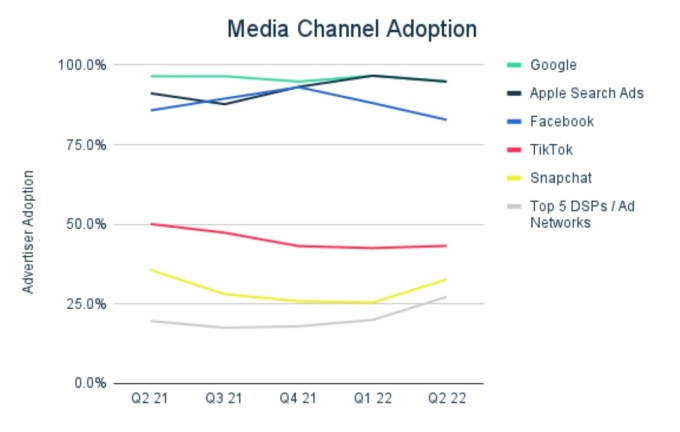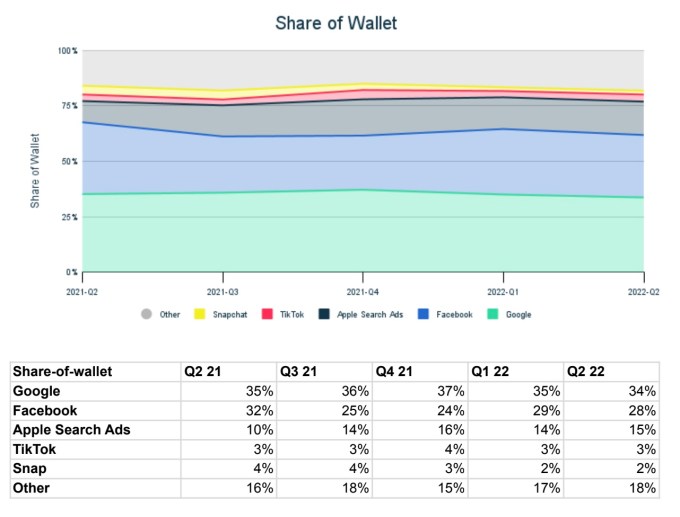A new report examing the impact of Apple’s privacy feature, App Tracking Transparency, indicates Apple’s ads business appears to have financially benefitted as a result of the feature’s launch. Now over a year old, App Tracking Transparency, or ATT, reached mass adoption in June 2021, allowing for a comparative year-over-year analysis of the post-ATT mobile ads landscape, which finds how Apple has benefitted from the privacy update.
According to a review by the performance insights platform InMobi’s Appsumer, Apple’s Search Ads business has now joined the Facebook-Google advertising duopoly after growing its adoption by 4 percentage points to reach 94.8% year-over-year, while Facebook’s adoption dropped 3% to 82.8%.

Image Credits: InMobi’s Appsumer
Facebook, or Meta as it’s now called, has long argued that Apple’s ATT would cut into its ad revenues. It has continued to update investors on the “headwinds” ATT is having on its own ability to monetize through advertising — an impact the social media company had estimated would reach $10 billion in 2022, though other analyses put that figure even higher.
Appsumer’s report takes a deeper look into mobile ad spend through an examination of over 100 different consumer apps, where the median spend of its customers hovers around $354,000 per month. The total sample of the annual spend examined in this report is over $500 million and is focused exclusively on advertisers in the North American and EMEA (Europe, Middle East, and Africa) regions, the firm said.
Notably, the report pointed out that Apple’s Search Ads business had historically lagged behind Facebook and Google’s ads business in terms of channel adoption, at around 75%. But in the post-ATT ads market, Apple’s footprint has grown significantly, allowing it a seat at the table alongside Facebook and Google.

Image Credits: InMobi’s Appsumer
In addition to the growing advertiser adoption of Apple’s Search Ads, the report also found Apple’s business grew its share-of-wallet by 5 percentage points, to reach a 15% share while Facebook’s share-of-wallet dropped 4 percentage points to 28% from Q1 2021 through Q2 2022.
Over the period analyzed, Apple’s Search Ads saw steady gains in terms of share-of-wallet, peaking at 16% in Q4 2021 before being again squeezed in the first half of 2022, as Facebook recovered. Overall, Apple gained 5 percentage points during this time. Facebook’s share-of-wallet was far more volatile, however, starting at 32%, dropping to 24% in Q4 2021, then growing to 28% in Q2 2022 — an indication of how Facebook was struggling with ATT’s rollout.

Image Credits: InMobi’s Appsumer
Google’s share-of-wallet remained more stable as it sees less impact from ATT, the report noted, given the majority of its spend is on the Android platform.
The new report also examined ATT’s impact on other tech companies, like Snap (Snapchat) and TikTok.
It found that TikTok was ahead of Snap in both advertiser adoption and share-of-wallet, though in the past it had been behind Snap on these fronts. However, TikTok’s advertiser adoption dropped nearly 7 percentage points year-over-year to 43.2% while its share-of-wallet remained steady at around 3%. Snap’s advertiser adoption, meanwhile, declined three percentage points year-over-year to 32.7%, after bouncing back from a low of 25.4% in Q1 2022. Its share-of-wallet, meanwhile, was cut in half from 4% to 2%, during this period.
Snap this past week announced layoffs, cutting 20% of staff following an internal announcement it would miss its revenue goals for Q2 2022.
In addition, the report noted that TikTok’s ads business is still new and sees many advertisers in the process of testing the platform to see if it meets their needs. Only some are finding success, so far.
The report arrives amid rumors that Apple could be considering the launch of its own DSP (demand-side platform), which would allow it to increase its Search Ads’ share-of-wallet further by leveraging its first-party data for targeting and measurement. The company also recently expanded its App Store ads from Search to also include listing on the Today tab as well as to individual app pages, giving it more ad slots to sell.
One year later, Apple’s privacy changes helped boost its own ads business, report finds by Sarah Perez originally published on TechCrunch















 English (US) ·
English (US) ·